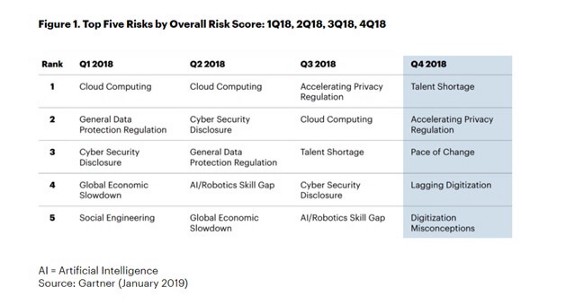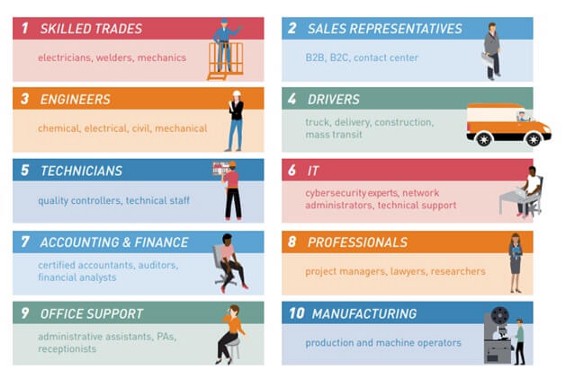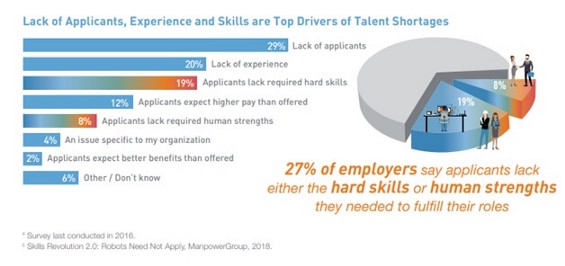Businesses worldwide are facing a critical talent gap that threatens to weaken the global economy. In the U.S. alone, thousands of companies are struggling to fill high-skilled jobs. The main causes of this talent shortage? Emerging technology and changing skills needs.
According to various research:
- In 2018, there were 7 million open jobs in the U.S., but only 6.3 million unemployed people were looking for a job.
- 75% of HR professionals say they’re having recruiting difficulties.
- More than 45% report a decrease in quality for specific positions.
We have a detailed analysis of various studies and reports below.
What is a talent shortage?
According to Gartner, Inc.’s latest Emerging Risks Survey, talent shortage has become the top emerging risk companies face globally.
Businesses are faced with challenges that stem from the pace of business change and the digitalization of their industries.
But what exactly is a talent shortage?
A skill shortage is defined as “an economic condition in which there are insufficient qualified candidates to fill the market demand for employment at any price.” Meaning, companies are not only struggling to fill open positions, but they’re also struggling with finding qualified candidates for those positions.
In this digital age, technology is transforming how a job gets done, creating new job positions that demand new specific skills. At the same time, companies are also increasing headcount, and as a result, talent shortages are more critical than they’ve ever been before.
Additional Reading: The Devastating State of Maternity Leave in the U.S.


What types of skills are missing?
Employers in all industries are faced with the same problems. From healthcare and manufacturing, mining and trade, companies struggle to locate the right people with the right skill set.
According to the SHRM’s skills shortage study 2019, 75% of those surveyed said they have difficulties finding qualified talent. They feel that the majority of applicants lack technical skills more so than soft skills.
The top 3 missing technical skills are:
- Trade skills (carpentry, plumbing, welding, machining)
- Data analysis, data science
- Science, engineering, medical
The top 3 missing soft skills are:
- Problem-solving, critical thinking, innovation, creativity
- Ability to deal with complexity or ambiguity
- Communication
Another study by Manpower Group found that skilled employees, including electricians, welders, and mechanics, as well as engineers and drivers, are among the top hardest roles to fill.
The top 5 roles to fill include:
- Skilled workers (electricians, welders, mechanics)
- Sales experts (B2B, B2C, contact center)
- Engineers (chemical, electrical, civil, mechanical)
- Drivers (truck, delivery, construction)
- Technicians (quality controllers, technical staff)
OECD Skills for Jobs database found that across OECD and EU countries alike, talent shortages are most critical in the area of Computers and Electronics. Soft skills, including judgment, verbal abilities, and decision-making, are second on the list.
Additional Reading: Why and How to Develop Collaborative Hiring Strategy


Do all companies struggle with a talent shortage?
It’s been found that bigger companies find it twice as challenging to fill roles. Nearly 67% of them report having difficulties hiring qualified talent and a quarter of them say they’re having more difficulties than they did a year ago. Roughly 56% of medium-sized companies report having difficulty filling roles, compared to 45% of small and 32% of micro-companies.
What’s preventing employers from getting the talent they need?
Lack of skills is not the only thing preventing employers from finding the talent they need. Nearly 29% of them say that the #1 reason why they can’t find employees is a lack of applicants. Another 20% say that applicants don’t have the required experience for the job. Moreover, 27% of employers say candidates don’t possess the required hard skills or human strengths for the position. There are other factors at play, including:
- Applicants expect higher pay than offered
- An issue specific to the company
- Applicants expect better benefits than offered
Additional Reading: Hiring for Startups? These Are the 7 Best Job Posting Sites to Use


How are companies fighting to close the skills gap?
Companies are beginning to realize the major problem with a talent shortage. Scared of economic downfall, they are coming up with strategies for tackling talent shortages. One way is through outsourcing their recruiting efforts.
Outsourcing recruiting efforts
Partnering with a third-party recruitment agency comes with a myriad of benefits. From IT recruitment agencies to medical recruitment agencies, they can play a critical role in helping companies find specific talent.
Access to a wide pool of talent.
When a company collaborates with a recruitment agency, they gain access to a wide pool of talent they otherwise would not find through job boards or internal postings. In fact, agency work is attractive to many candidates. A staffing agency can connect companies with the most exceptional employees in the job market. The best part? These agencies have a pool of candidates who are ready to start working at a moment’s notice.
Reduced costs.
Working with a recruitment agency might be cost-effective in the long run. As they take care of the whole employment process and do all the legwork, your company will be relieved of many costs. You won’t have to worry about training costs, payroll processing costs, and benefits administration costs.
Time saved.
What’s more, HR professionals know how time-consuming recruitment is. When a company works with a recruitment agency, it can skip long processes like:
- writing job descriptions
- posting jobs on different outlets
- reviewing tons of applications
- interviewing candidates
The agency will take care of these major processes for you. It’ll save you time and find you the most suitable candidate for the job.
Less risk.
Many staffing agencies offer a trial period so that you can see whether the candidate fits the job position. Companies will get the chance to see for themselves whether the employee possesses the required skills and has a good personality and professionals. If you feel like the candidate is not a good fit for the company, the agency will either replace them for free or give you your money back.
Apart from recruitment agencies, other strategies for bridging the talent gap include:
- Training and development (offering onsite training to employees like seminars and training programs)
- Training internal employees to take on hard-to-fill positions
- Increasing compensation
- Hiring an external workforce (for example temp-to-hire employees, independent contractors)
- Offering flexible or remote working
Additional Reading: Why Transferable Skills are Important for Recruiting Top Talent
Key Takeaways
One thing is for certain: companies of all sizes are faced with a talent shortage driven by the advance of technology. To remain competitive and enter the future of work, they must apply a workforce strategy for locating high-quality talent. From partnering with recruitment agencies to offering training to internal employees, solving the crisis is possible. Once companies find a way to bridge the current skill shortage, only then will they be able to reach their potential in the digital age.









